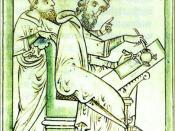Throughout Plato's "Euthyphro"ÃÂ and his "Apology,"ÃÂ the young Graecian examines the words and testimony of Socrates. From the ancient philosopher's debate with Euthyphro over the persecution of his father, to his trial in Athens, the readers learn much in the views and reasoning of Socates within the two short stories. Moreover, Socrates discusses many subjects, including piety, knowledge and the value of living a closely examined life. Much of what the wise Athenian says in regard to these subjects is an attempt to show the superiority of leading a life of reason. As Socrates puts it, the "unexamined life is not worth living for a human being."ÃÂ Yet, there is much controversy over the beliefs of Socrates. Many people are in disagreement with his conflicting philosophic nature of life. A good example of how Socrates brings about conflict of opinion can be found in his discussion with Euthyphro, which takes place in Plato's "Euthyphro."ÃÂ Socrates examines Euthytphro regarding the prosecuter's decision of whether or not to convict his father of murder. Euthyphro explains to Socrates that his father has allegedly committed a murder involving impiety. That is where students of this tale begin to see Socrates' argumentative side.
He cross-examines Euthyphro in a way in which he is able to extract Euthyphro's understanding of the term piety. In his opinion, possessing piety is to imitate the gods. Euthyphro makes an allusion to the manner in which Zeus prosecuted his father, Kronos. Later, Euthyphro amends his definition of piety to mean that which all gods love. However, Socrates quickly refutes this definition by explaining that a thing that "is loved..is something loved (Introduction pp.13)."ÃÂ In other words, because the gods love something does not define the thing as pious, but rather as a thing loved.


